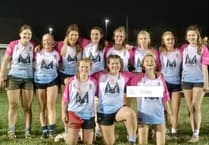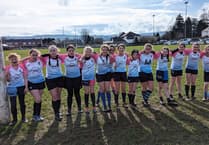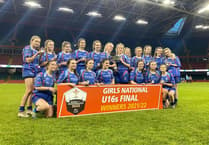INJURIES and non-availability forced Aberystwyth to field a much-changed side for this revenge match against the side currently second in Division One West.
Llanelli Wanderers had taken the visitors’ long-standing unbeaten home record earlier in the season, and they were expected to be formidable opposition on their own patch - and so it proved.
Conditions were generally good as the home side chose to play down the slope in the first half. Within a few minutes Aber were penalised for a ruck offence and No 10 Lloyd Thomas put over the kick from 45 metres out, to open the home scoring.
This was followed minutes later by a drop goal by Rich DeFillipo for a 6-0 lead.
Aber were under severe pressure in the first quarter of the game as Wanderers launched attack after attack, but the visitors’ resolute defending prevented the home team from going further ahead.
Eventually, Aber came more into the game and possession and territory were evenly shared and vigorously defended.
Aber scrummaged competitively in the first half which, considering the absence of their regular second rows and much rearranged back row, was to their credit.
In the line-outs the visitors competed but were generally outclassed by the home side’s jumpers and spoilers.
In the loose the visitors covered and tackled well, but it was clear that the home side’s tactic of taking the ball on the burst was taking its toll on the Aber defence.
Towards half-time Aberystwyth prop Kevin Jones was shown a yellow card for pulling down a maul near their line.
The home side made full use of this numerical advantage to increase pressure.
This resulted in two quick tries. The first came from a catch and drive at a five metre lineout by Dan Griffiths, soon followed by a good break by outside centre Jonny George, who fed Daf Daniel to score.
Both conversions failed, but Wanderers were well ahead at 16-0 and well in control as the half-time whistle was blown.
Surprisingly, the visitors persisted with the same tactics in the second half when using the slope, and kicking to the corners would have served them better. This reluctance to change approach, coupled with aggressive pressure from the home side, reduced opportunities considerably.
The pressure told as Aberystwyth’s players suffered knocks and had to be replaced. This, together with a few substitutions, further disrupted the visitors’ play.
Although the home side’s kicking out of hand was superior to Aber’s, the visitors did make ground, and when they were awarded a penalty 22m out, Steffan Rees made no mistake with the kick to finally put the visitors on the scoresheet at 16-3.
As the home side became more confident of building on their lead, so they left more space behind their three-quarters.
This cried out for better use of the slope with tactical kicking to the corners; but Aberystwyth kept to the same pattern of confronting the opposition in a physical battle instead of out-thinking them.
This approach was not helped by some baffling decisions by the match referee, most of which went against the visitors.
Aber’s try came from a neat interception by Gruff Jones as he raced 50 metres to score under the posts, crowning a good performance in his 40th consecutive appearance for the 1st XV. Steffan Rees converted to bring the score to 16-10, and the possibility of a losing bonus point loomed.
It was inevitable that tireless tackling and covering would eventually take its toll on the Aber players and the home side made better and better use of the superior possession they had enjoyed throughout.
Cracks began to appear in the visitors’ defence and it was very much with the run of play that Wanderers’ wing forward Elgan Morgan finished off an attack with a try in the corner. The conversion was missed and the game ended at 21-10.
Not one of Aber’s players could be criticised for lack of effort or commitment.
Paul Stubbs and his fellow back row forwards did their best as did Bryn Shepherd at second row. The front row scrummaged well and held their ground.
Behind the scrum, Aber were usually under pressure as the home side backs were allowed to come up very quickly to disrupt the flow of visitors’ attacks.
But despite these efforts Aber’s failure to recognise where advantages could be gained and the game possibly won, cost them dearly. In this respect they did not do themselves justice on the day.




